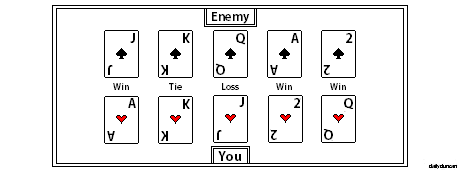“Cogito!”
From this point forward, that’s all you’ll be hearing when someone suggests a card game. Welcome to Cogito. Cogito [ko-jee-toh] a simple yet elaborate test of raw strategy. This game uses basic strategic concepts of aggression, passivity, anticipation, repetition and unpredictability to judge who is the more intelligent person. Here’s how it works:
To play, you will need a deck of cards, more specifically, two Aces, two Kings, two Queens, two Jacks and two 2s. Each player receives one of each of the cards. It’s best to have each set made up of cards of the same suit so that the teams are more clearly identified, and so the game is prettier. Each card has a rank, and based on that rank, they defeat lower ranked cards in combat. This works in a similar way to the game of War, but there is one exception to the ranking: a 2 will beat an Ace. Unlike War, however, the cards are not played randomly, but are chosen by the player and then placed face down until both players have ended their turn. Once both players have placed the card on the table, they flip them and the outcome of that battle is revealed. Since each player has five cards, there will be five battles in every match. The game shares its single card combat with War, its strategy for aggression and preservation with Stratego, and its requirement for layered anticipation of an opponent’s decisions with Rock-Paper-Scissors.
As in war, there are good victories and bad victories. Few things are more frustrating than flipping over an Ace and seeing your opponent reveal a card under five – what a waste! In that scenario the loser is often the more satisfied player. In Cogito as well, a good victory would be one where your card defeats your opponent’s card by a narrow margin, such as an Ace beating a King. A bad victory would be having your King defeat your opponent’s 2. The goal is to win more battles than your opponent, and to do so you must avoid bad victories.
In Stratego, players must choose where to place their power pieces, such as the Marshall, and where to place their loser pieces, such as the Scout. Although charging into a bomb and being blown to pieces may technically be considered scouting, it’s doubtful that the Scout had this in mind when he accepted the position. Anyway, placing your more powerful pieces in aggressive locations makes them vulnerable to attack, but can also pay off big by catching your opponent off guard. In Cogito, Players may play conservatively and choose a feeler card such as a Jack or Queen first, in order to get a read on their opponent’s strategy, but they will lose the first battle to a more aggressive strategy. Conversely, a more aggressive strategy, such as playing your Ace first, could either start things off with a bad victory or even the dreaded Two-over-Ace upset.
Rock-Paper-Scissors is a completely level battleground with each weapon having an equal chance at victory and an endless supply. Because of this, Rock-Paper-Scissors relies on only one method for creating a strategy: anticipating your opponent’s strategy. If your opponent has played Rock the past two games and was just defeated by your Paper, you should switch to Rock because he might think that you think he will do Rock again and choose paper, so he chooses scissors to beat your paper but is defeated by your Rock. If he does, by chance, choose Rock a third time then you will tie, which isn’t the end of the world. Cogito uses this theory of repetition and anticipation to help produce a solid strategy that takes into account your opponents previous choices and, therefore, likely future choices. If your opponent has opened with Jack King or Queen King the past two games you can make an informed assumption that he will either stick with the ‘feeler-killer’ strategy a third time or play an Ace out of the gate to take out your Queen or King that you would use to beat his Jack or Queen. In advanced Cogito strategy, players use cautious early games to bait their opponent into a more aggressive opening and then take advantage of it.
In tournament Cogito, players can choose to lay down more than one card at a time (up to all five) in order to throw off an opponents play style. A player may open with a feeler card, such as a Jack, then place two, three or four cards face down on their next turn. When multiple cards are played, the game still takes place one battle at a time, but there are two sets of tournament rules which have differing instructions on how to respond to a multi-card play.
The first set of rules, commonly called Business Cogito, dictate that a player may respond to a multi-card play by laying down any number of cards. So in response to a four-card play, the player may play one card at a time, observing each battle before laying down additional cards. In the second variation, often called Thai Cogito, the responding player must play the same number of cards as his opponent.
Players who frequently lay down multiple cards are not welcome in some circles, since professional players are often frustrated by multi-card plays, especially from newer players. Sometimes the best strategy to combat multi-card play is abandoning single card strategy and going all in – placing all of your cards face down on the table.
Casual Cogito rules dictate that players must engage in one of two play styles: each player must either play one card at a time or lay down all five cards at the beginning of the game. This format reduces frustration with ‘cheesy’ multi-card strategies by focusing on the fundamental strategies of Cogito instead of optimizing player’s abilities to influence their opponents. When playing for money with friends or at the casino, Thai Cogito is the format of choice.
Here is an example of how an average game of Cogito might play out:
As you can see, you have won the game 3-1 with one tie. At Cogito tables in Las Vegas, players can bet on the bad-beat of Two-over-Ace or a certain number of wins or ties, similar to the side betting found in Blackjack. A 5-0 victory can pay big dividends for the casino player, but is virtually unheard of on the professional Cotigo circuit. With every card played, the options for each player become more limited and when each player has only two remaining cards the strategy is sharpened to pinpoint precision.
Try Cogito. You won’t like your friends as much afterward.
Click here to download Cogito for PC.
Click here to download Cogito for Android.

